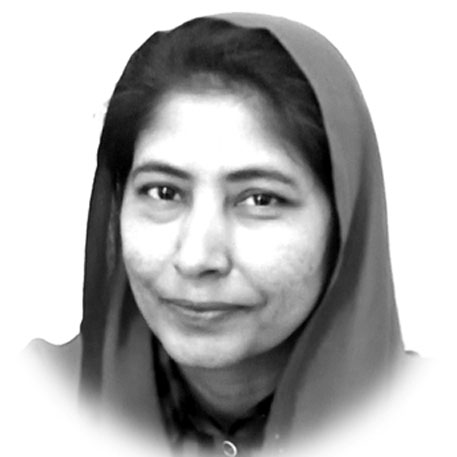Dr Nasreen Akhtar
THE United States and Pakistan had an ideal bilateral relationship during the 1960s-80s, despite the fact that both had different goals – the United States desired to contain the (erstwhile) Soviet Union and Pakistan needed security and military assistance for its survival. We must acknowledge that both, the US and Pakistan, needed each other during and even after the end of the Cold War. Several times both countries separated but not divorced. In an intensely changed world system, Pakistan’s strategic ties of the Cold War era faded off too fast to leave any visible track to firm up eroding foundation of relationship. There was a complete reversal in relations when George W Bush Senior refused to do annual certification mandated by “the US Congress as a requirement for the continuation of economic and military assistance to Pakistan in the fall of 1990, less than two years after Moscow completed its withdrawal from Afghanistan”.
The economic and military sanctions hurt Pakistan in many ways, including the impounding of the F-16s and other military equipment paid up by Pakistan. More than that was the trust, mutual confidence and a strong tradition of cooperation between the two countries. In 1993, the United States even threatened to declare Pakistan a “terrorist state for its support to the freedom fighters in Kashmir”, certainly the United States did that to please India. It was averted after a lot of diplomatic efforts and change of regime in Pakistan. “Five years later, second layer of sanctions was imposed for Pakistan’s tit-for-tat demonstration of nuclear capability on May 28, 1998”. Military coup in October 1999 brought another layer of economic sanctions. Pakistan faced tough economic, security and diplomatic channels.
On the other hand, India and United States, freed by the compulsions of Cold War era moved closer. The entire structure of United States policy toward South Asia changed with India as a regional power, offering one the largest markets with fast growing economy as the main focus of it. The security and strategic content that India wanted to be part of the package was quickly recognised and accepted. Relations with Pakistan remained unsettled and all efforts by Pakistan failed to revive the old spirit simply because the issues that defined their relations in the past had lost relevance and the new issues of regional and global importance moved them in different, if not opposite directions. All what Pakistan contributed to the American success in winning the Cold War, defeating Soviet communism in Afghanistan at a very high human and material cost, and more importantly its strategic importance as a traditionally moderate Islamic country on the tri-junction of three strategic regions were ignored.
Pakistan’s domestic failures in terms of building a stable democracy, decline in economic performance and governance and rise of religious extremism were also important factors in turning the United States in other direction. Many of the policymakers and those who had studied Pakistan for long became concerned with what they believed as a “failing” state apparatus, but preferred to stay away, leaving the country to fend for itself. Some of the structural problems in Pakistan’s politics, particularly, the civil-military relations have something to do with security ties with the United States as it affected our state formation process. This is a controversial subject as to how much this imbalance owes to our policy of alliance and how much it is due to reasons of political culture. Moreover, it’s not only Pakistan, military plays its role in even the developed states like the United States, where Pentagon has its effective “ say”.
The tragic events of September 11 brought in its wake changes in the United States’ policy of global proportions “that have affected Pakistan’s regional security environment more than any other country in the neighbourhood” The fast movement of events presented Pakistan a difficult terrain to negotiate. Essentially, it had only two options; to stay an ally and supporter of the Taliban or join the American led international coalition against terrorism and to eliminate the Taliban’s regime. Realistically, there was nothing in between these two alternatives, as even genuine attempts to find a neutral course would have damaged Pakistan’s national security interests. Triggered by public anger, humiliation and the scale of human tragedy, the immediate reactions of the United States left us no room for any grey area. Pakistan quickly but positively responded and became the United States’ partner and this was the third partnership between the United States and Pakistan.
It would be overemphasizing the point that statecraft, strategic decisions and pursuit of national interests require prudence, cool reflection and careful weighing of costs and benefits of various alternatives. This amounts to what in the policy making jargon is known as rational choice theory. This applies to every situation and every decision that any government according to this formulation takes. Not all leaders or governments, military or civilian are equipped with the talent of making rational choices. The world history is full of errors more than rational choices in crisis situations. In our view, Pakistani leadership was quick to recognise the opportunity of refashioning its relations in protecting and advancing national interests in a radically transformed regional and global environment.
After Abbottabad raid, Pakistan reshaped its foreign policy and preferred to set its relations with Russia, China already considered all weather friend and China has invested huge amount which is making fundamental difference in developing Pakistan’s infrastructure and its international economic connectivity. Temporarily, the two old allies got separated when President Trump preferred to grant India a significant role in Afghanistan. President Trump taunted Pakistan, but Pakistan wisely responded. The United States and its policy-makers are convinced that without Pakistan’s political assistance it is hard to leave Afghanistan. Complex geopolitics has brought the United States and Pakistan closer once again. To achieve something, it is important to forget the previous tales to move forward, this is the bitter reality of real-politics in international arena.
—The writer is Assistant Professor, IIUI, Islamabad.










